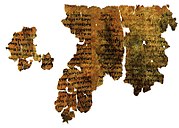

| Jewish mysticism | ||||||||||||||||||||||||||||
|---|---|---|---|---|---|---|---|---|---|---|---|---|---|---|---|---|---|---|---|---|---|---|---|---|---|---|---|---|
 | ||||||||||||||||||||||||||||
| History of Jewish mysticism | ||||||||||||||||||||||||||||
|
Forms
|
||||||||||||||||||||||||||||
|
|
The Hekhalot literature (sometimes transliterated Heichalot) from the Hebrew word for "Palaces", relating to visions of ascents into heavenly palaces. The genre overlaps with Merkabah or "Chariot" literature, concerning Ezekiel's chariot, so the two are sometimes referred to together as "Books of the Palaces and the Chariot" (ספרות ההיכלות והמרכבה). The Hekhalot literature is a genre of Jewish esoteric and revelatory texts produced some time between late antiquity – some believe from Talmudic times or earlier – to the Early Middle Ages.
Many motifs of later Kabbalah are based on the Hekhalot texts, and the Hekhalot literature itself is based upon earlier sources, including traditions about heavenly ascents of Enoch found among the Dead Sea scrolls and the Hebrew Bible pseudepigrapha.[1] Hekhalot itself has many pseudepigraphic texts.[2]

Some of the Hekhalot texts are:[3]
Other similar texts are:[4]
The Hekhalot literature is post-rabbinical, and not a literature of the rabbis, but since it seeks to stand in continuity with the Rabbinic literature, it is often pseudepigraphical.[5]
Hekhalot has examples of early alternate history texts.[2]
This Kabbalah-related article is a stub. You can help Wikipedia by expanding it. |